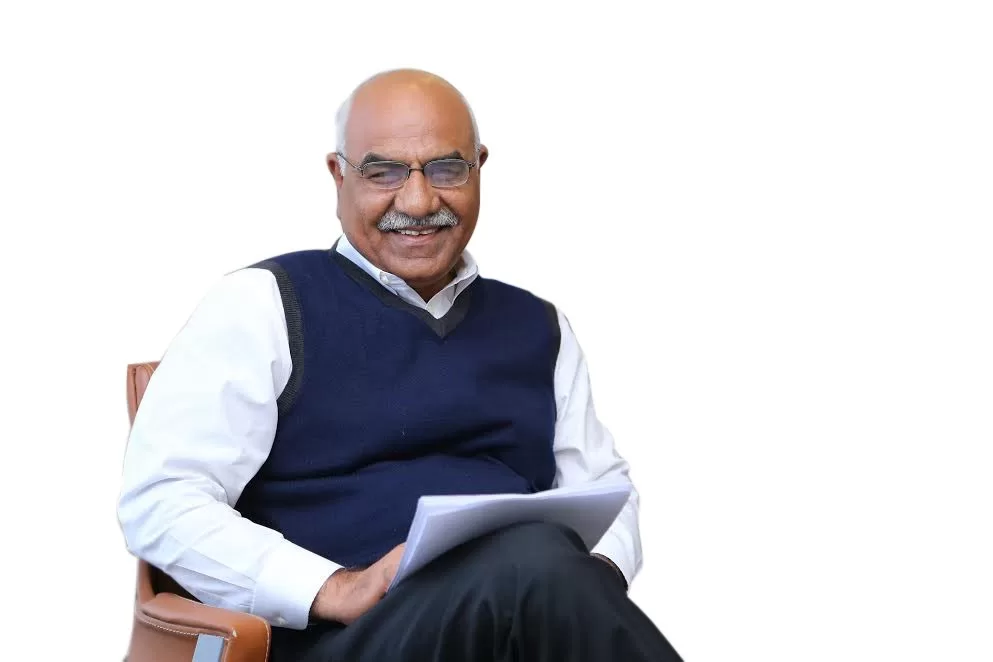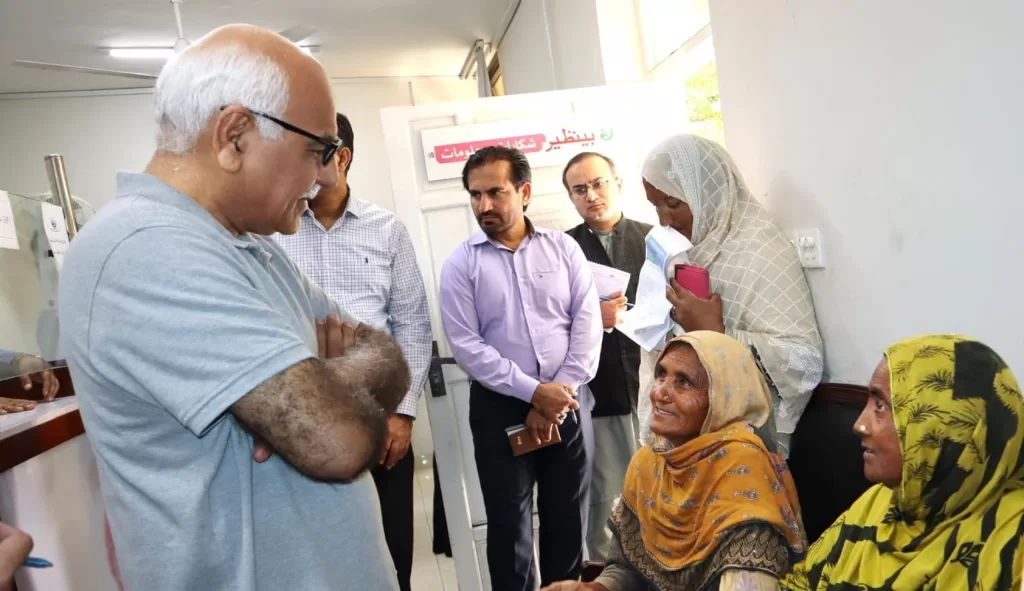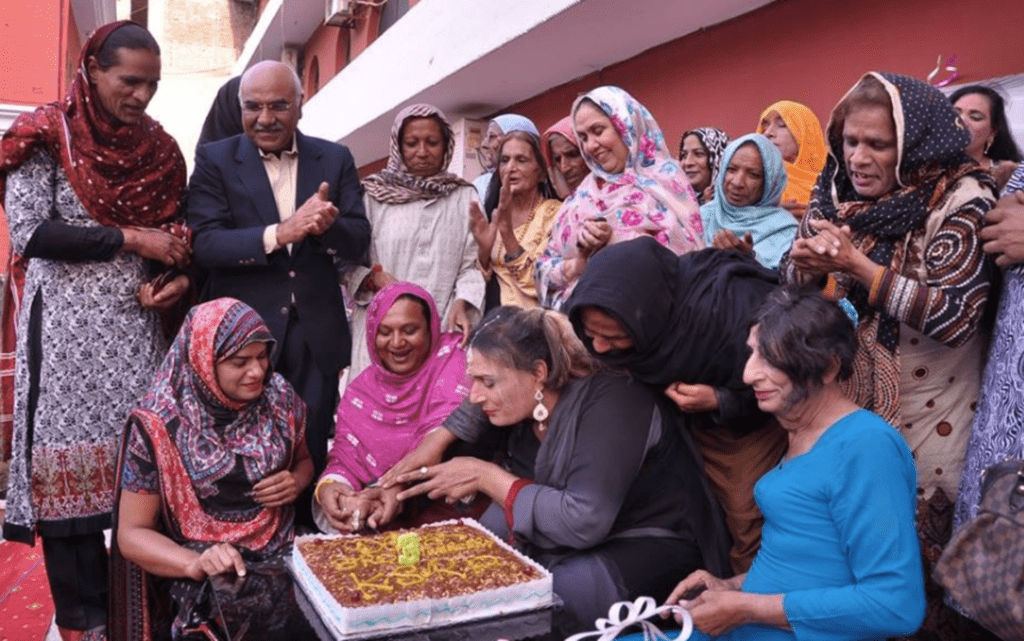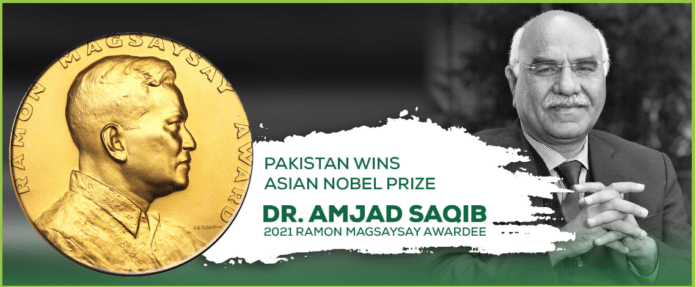Dr Saqib, chairperson of Benazir Income Support Programme (BISP) and the founder of Akhuwat, leads the first-ever interest-free microfinance program operating from mosques and churches, acclaimed internationally for its innovative model. Demonstrating a commitment to inclusivity, especially towards disadvantaged women and religious minorities, he prioritizes female applicants and fosters inter-faith collaboration through various places of worship.
As Akhuwat considers global expansion, he underscores the universal spirit of solidarity and the innate human instinct to assist one another. The organization’s numerous inspiring stories underscore the profound impact of modest financial support in fostering a just and economically empowered society. The incredible story of the Akhuwat Foundation is incomplete without delving into the life of its founder Dr Amjad Saqib. He is a distinguished social worker, volunteer, and development professional, who brings a wealth of experience and expertise to the realm of microfinance, philanthropy, and poverty alleviation. His work is acknowledged worldwide and he received the Ramon Magsaysay Award in 2021.
He also received the Khush Hal Khan Khattak Literary Award from the Government of Punjab in 1993 for his literary contributions as an author of nine books and a renowned columnist. He has also been honoured with Sitar-e-Imtiaz. He is a graduate of King Edward Medical College Lahore and holder of a Master’s degree in Public Administration from the American University, Washington D.C., and embarked on a civil service career in Pakistan in 1985. Following a notable role as General Manager with the Punjab Rural Support Programme (PRSP) for seven years, he resigned from civil service in 2003.
Since then, Dr. Saqib has dedicated himself to philanthropy, offering consultancy services to prestigious institutions such as the Asian Development Bank, International Labour Organization, UNICEF, World Bank, and the Canadian International Development Agency.
In this exclusive interview, Dr Amjad Saqib shares insights into his experiences, challenges, the transformative power of interest-free microfinance, and his initiative of providing loans (Qarz-e-Hasna) to deserving students and providing them education to help break the cycle of poverty.

The Journey from a doctor to a philanthropist
In life, one should engage in work that brings fulfilment. If you’re truly on the journey of self-actualization, you must discover what resonates with you. There are four essential pursuits in life:
• Engage in something you love.
• Pursue something you excel at.
• Involve yourself in activities that provide financial incentives.
• Contribute to endeavours that benefit the community.
If one only focuses on one of these aspects, they achieve only 25% of their potential. A more fulfilling life involves combining passions and strengths. Integrating financial stability enhances the journey, and finding a vocation that aligns with all four aspects completes a person. For instance, as an artist, I find fulfilment in loving and excelling at my craft, receiving financial outcomes aligned with my needs (as opposed to desires), and contributing positively to the community, a concept deeply rooted in Islamic values. Distinguishing between needs and wants is crucial. The pursuit of desires may be insatiable, but focusing on needs fosters a sense of contentment. The fourth element involves doing something beneficial for others and the community, aligning with values that prepare one for a higher purpose.
Reflecting on my journey, I realized that pursuing a career in medicine (MBBS) didn’t align with my passions or strengths. Shifting to civil services brought its challenges; however, after years, I acknowledged that it didn’t resonate with my creative and innovative mindset. Having the courage to step out of my comfort zone led me to explore diverse projects until I found true fulfilment.
Expressing gratitude for the strength provided by Allah, I emphasize the importance of balancing life. I dedicate one-third of my time to family, another third to volunteering for Akhuwat (my passion), and the remaining third to earning a livelihood. This balance has shifted over time, leaving me primarily committed to Akhuwat, driven by passion rather than financial gain.
The Genesis of Akhuwat Foundation
The inspiration behind initiating and leading the Akhuwat Foundation stems from an encounter in 2001. At that time, I was actively involved with the Punjab Rural Support Program which provided small business loans in rural villages of Punjab. One day, a woman approached me; she was the sole provider for her family after her husband had passed away. Moved by her challenging circumstances, I decided to extend a helping hand and offered her an interest-free loan of Rs. 10,000. To my surprise, the woman returned after six months and repaid the entire amount. She shared that the amount had enabled her to purchase two sewing machines, kickstarting her stitching business and granting her financial independence. Her tearful expression of hope and gratitude left a lasting impression on me.
This incident catalyzed my trust in people and the potential of interest-free microfinance. The woman’s request upon repaying the loan was simple yet profound – that the amount be given to another individual facing similar challenges. This marked the inception of Akhuwat.
Illuminating Akhuwat’s Vision and Mission
Akhuwat, driven by a unique vision and mission, distinguishes itself from conventional systems profiting from high interest rates. At the core of Akhuwat’s model is the universal concept of brotherhood, emphasizing the importance of viewing the less fortunate as brothers and sisters and sharing resources between those who have and those who have not. While rooted in Islamic principles, the model of Mawakhat transcends religious boundaries, aligning with the shared message across religions to care for others as one would like to be cared for. Beyond microfinance, Akhuwat’s interventions extend to education, offering fee-free quality education to over 45,000 students and supporting marginalized groups through initiatives like the Clothes Bank and Khwajasira Support Program.
Akhuwat Internship Program
It is not just an internship opportunity but Akhuwat‘s succession plan. It is finding leaders and nurturing them. The objective is not only to transform Akhuwat into an enduring institution but also to learn from the experience and lessons of Akhuwat and apply them at as large a scale as possible.
Students are provided with internship opportunities to develop job market skills and get jobs as they complete their education.
Empowering through Education and Skill Development
Akhuwat is dedicated to empowering beneficiaries through a comprehensive approach involving education, skill development, and income generation. The organization has taken charge of 305 primary schools from the Government of Punjab, providing free, quality education through Akhuwat College for Women in Chakwal and Akhuwat College Kasur for men. These campuses, spanning 50 acres, offer hostel facilities to students nationwide. Recently venturing into IT, Akhuwat provides free IT courses, offering opportunities for individuals, especially women, to earn from home. Additionally, the organization has initiated training programs in stitching to enhance the livelihoods of women.
A Distinctive Approach to Education
Akhuwat Education Services (AES), has deviated from traditional methods by providing free, high-quality education to deserving students since 2014. AES focuses on leadership, critical thinking, and values like integrity to prepare students for a changing world. Unlike conventional models, Akhuwat recognizes illiteracy as a barrier to social and economic mobility, offering education at all levels for empowerment. The initiative values compassion, equity, and justice, aiming to create a socially progressive, economically vibrant, and poverty-free society. Akhuwat University selects students based on academic merit and commitment to ethical leadership, fostering a diverse and inclusive community from all across Pakistan. In Akhuwat’s institutes, state-of-the-art resources are provided without charging any fee. Moreover, students are selected from all provinces of Pakistan including AJK and Gilgit-Baltistan to promote a prosperous environment.
Community Engagement and Sustainability
Community engagement lies at the heart of the Akhuwat Foundation’s education programs, serving as a crucial element in guaranteeing sustainability and nurturing a sense of ownership. At Akhuwat, we prioritize the active participation of the community in all facets of our educational initiatives. Notably, we extend this commitment by involving our students in community projects, creating a symbiotic relationship between education and community development.
We envision our students as catalysts for positive change, actively participating in initiatives that contribute to the betterment of this community. This proactive engagement not only benefits the town but also imparts a valuable sense of civic responsibility, community service and leadership skills in our students. Our students are our successors, they are the torchbearers of the Akhuwat vision who will remember to support those less fortunate just as they were supported in their lives.
Expanding Educational Horizons
Akhuwat Foundation is dedicated to expanding educational initiatives for underprivileged students across Pakistan. Leveraging the success of Islamic Microfinance, we believe in a multi-dimensional approach to tackle poverty. Alhamdullilah, we are expanding our outreach in our colleges in Chakwal and Kasur, Akhuwat College Kasur (ACK) will also soon be Pakistan’s first fee-free university providing higher education completely free of cost to underprivileged students across Pakistan.
ACK has also started a school for Hospitality and Tourism and along with our IT courses, our educational initiatives continue to grow in number and quality. We do not discriminate in geography or gender, and Insha Allah will continue our mission as long as we can.

Financial Sustainability with Donations
I began with an initial investment of a few thousand, and now the Akhuwat microfinance model has billions. What further evidence does one need to seek donations or ensure sustainability? The Akhuwat model rested on two fundamental assumptions:
• There are individuals in the world willing to contribute donations.
• If we extend a loan to someone, they will repay it.
When embarking on charity, people make annual commitments in the name of Allah. Society, predominantly welfare-oriented, follows the belief of giving more than needed, forming our foundational assumption. People are basing their lives on “needs” rather than “wishes.” They adhere to the belief that “O messenger, people ask what to give in the name of Allah; tell them to give more than they need.” How can someone commit to charity in the name of Allah for one year and then declare they won’t continue the next? Most people consistently give Sadqa and Zakat annually. Our Mawakhat Model, rooted in Islamic values, challenges Western perspectives on sustainability, centering around giving, compassion, and a shared life beyond the present year. Contrary to Oxford University’s stance on sustainability, our Mawakhat Model thrives. Even Harvard University echoes the sentiment that sustainability is contingent on continued donations. I countered, stating, “Where your economics end, our Islamic Model begins.” This enduring concept will persist, outlasting the Akhuwat organization itself.
Challenges and Opportunities: The Founder’s Perspective
As the founder of the Akhuwat Foundation, I embrace challenges as opportunities for growth and positive impact. One significant challenge involved convincing people of the long-term viability of our unique microfinance approach, distinct from traditional models burdening borrowers with financial and operational costs. We believe that lending money should bear these expenses, minimizing operational costs by forgoing luxuries and utilizing religious places for loan disbursement. Addressing challenges involves leveraging volunteerism, where diverse backgrounds play a crucial role in Akhuwat’s philosophy. Our bottom-up approach, engaging volunteers, conducting field visits, and participating in sensitization campaigns reflects our commitment to sustainable change led by the community.
In parallel, addressing primary challenges in poverty alleviation programs involves innovative strategies, continuous evaluation, adaptability, and learning from past experiences. This dual approach allows us to continually improve and expand our operations for greater impact.
Trust and Transparency Pillars of Akhuwat’s Approach
Trust and transparency are at the core of Akhuwat’s approach. When beneficiaries seek a loan, a meticulous appraisal process is initiated. Both male and female heads of the household sign the loan form, fostering accountability. The application undergoes a thorough background check, which includes a financial and social appraisal that includes home visits and community assessments. Loans are approved by the Loan Approval Committee and are mostly disbursed in groups of 3-5 beneficiaries who act as each other’s guarantors.
Monthly instalments are returned over 1 to 3 years, with branches providing business advice and monitoring progress. Borrowers, turned donors, contribute to Akhuwat’s revolving credit pool, creating a culture of solidarity and mutual respect. Loan officers maintain frequent interactions, and the returned loans become part of a fund reused over many years to support other deserving members of society.
This transparent and inclusive process builds trust with both beneficiaries and donors, fostering a lasting bond of brotherhood. In addition, our donors who are the driving force behind Akhuwat also receive transparent reports regarding how their generous donations have been utilized. There is a thorough monitoring and evaluation process which ensures the accountability of all our operations.
The Importance of Philanthropy Support of Individuals and Organizations
Philanthropy plays a crucial role in uplifting deserving families, and Akhuwat embodies this spirit through interest-free microfinance, education and empowering those most in need. Individuals and organizations can actively support Akhuwat’s mission by contributing to its unique model based on brotherhood and solidarity by helping spread the message of our organization. Additionally, volunteering time, skills, or resources further strengthens the foundation’s reach. Philanthropy cannot be practised in isolation by one individual or organization, it needs the support of the civil society, and private and public organizations to achieve our vision of establishing a poverty-free society.

Future Goals for Akhuwat University
Currently, our focus is exclusively on departments such as IT, Economics, and Tourism and Hospitality in our colleges, emphasizing quality over quantity. For context, Punjab University offers 70 disciplines with an annual budget of approximately 10 billion, but we have financial constraints. Consequently, we will concentrate solely on these chosen departments, opting for vertical expansion. For instance, if we enroll 50 students today, the aim is to have 100 tomorrow. Notably, the Tourism and Hospitality Department is of particular importance, given that every 11th person globally is connected to the tourism and hospitality sector.
Looking ahead, the fourth department we plan to introduce is Philosophy, Ethics, and Morality as it addresses cross-cutting themes. Our objective is to nurture a holistic education, avoiding the mere transformation of students into computer-centric machines. We seek to instil fundamental ethics, and thus, we are in the process of establishing these four disciplines. While three are currently operational, we await donations and funds to initiate the fourth.
Discussing the concept of ‘Qarz e Hasna,’ we impart moral teachings to our students. We encourage them that as future professionals in fields like medicine or IT, they should personally educate at least two students without any formal contract. This approach is driven by the moral obligation to give back, creating a virtuous cycle. Our message to them is clear: this is how they contribute to society.
Vision and Mission of BISP
The vision and mission of BISP are centered around uplifting underprivileged families by providing financial assistance and promoting education. This aligns closely with my philosophy of empowering the disadvantaged through education, as education is a crucial tool for breaking the cycle of poverty
Collaboration for Poverty Alleviation
BISP collaborates extensively with various organizations and stakeholders, fostering partnerships to combat poverty and advocate for social justice in Pakistan. We work alongside Government bodies, civil society and international organizations including UN, WB, ABD, GIZ etc. to ensure a holistic approach to addressing poverty-related challenges. Many of the above entities financially contribute and provide support towards different programs of BISP including Unconditional Cash Transfers, Conditional Cash Transfers (Education/Health and Nutrition) and Educational Stipends.
Key Achievements of BISP
BISP has achieved significant milestones by providing financial assistance to disadvantaged families, enhancing their livelihoods, and promoting education among children from these families. Notably, the program has facilitated increased school enrollment and attendance rates among beneficiary children.
Some of the salient achievements of BISP are: BISP’s Taleemi Wazaif has disbursed Rs. 80.44 billion to 11.45 million children, while the Kafaalat Program, initiated in 2008, has provided Rs. 1,797.7 billion to around 9.2 million beneficiaries, paying Rs. 8,750 per quarter to each family. The Nashonuma Program, launched in 2019, has disbursed Rs. 7.30 billion to 1.4 million Pregnant and Lactating Women (PLWs) and children under two, addressing stunting and micronutrient deficiencies. BISP Scholarships for Undergraduates have distributed Rs. 29.254 billion to 102,003 students based on merit and need. The Hybrid Social Protection Scheme (HSPS), targeting financial independence, offers a matching grant of up to 40% for beneficiaries with PMT scores between (0 to 40). Additionally, BISP has introduced Digital Financial Literacy Training in 15 tehsils, with expansion plans, and deployed 25 Mobile Registration Vehicles for household registration in remote areas. Notably, transgender individuals can now become BISP beneficiaries without PMT cut-off limitations, with 222 transgender persons currently benefiting from the program.

Future Endeavours
Our future goals include creating easy and accessible payment options for beneficiaries without compromising transparency. In this respect, BISP is in the process of onboarding more financial services providers to increase the pool and quality of the payment disbursement process. We are actively employing data-driven strategies to target beneficiaries more effectively. Using our National Socio-Economic Registry (NSER) which is a digitized, geo-referenced and updated data set, BISP has disbursed emergency cash payments to beneficiaries during recent emergencies including floods and the Covid-19 pandemic within a few days. Many international donors are supporting different initiatives of BISP.
Community Involvement for Success
The community plays a pivotal role in BISP’s success. Active involvement and engagement of local communities can facilitate better targeting of beneficiaries, enhance program effectiveness, and promote a sense of ownership and responsibility among the people we serve.
Bridging the Financial Inclusion Gap
BISP is actively working to bridge the financial inclusion gap by promoting access to financial services for the unbanked population. In this respect, several initiatives like the Social Protection Account (SPA) and the Hybrid Social Protection Scheme (HSPS) have been introduced. These initiatives shall help to bridge the financial inclusion gap and empower beneficiaries. Moreover, Digital Financial Literacy Training has been launched in 15 tehsils across Pakistan with the support of development partners to create awareness and sensitize BISP beneficiaries.
Addressing Criticism and Ensuring Accountability
Criticism is welcomed as it offers insights for improvement. BISP maintains transparency and accountability through regular audits, open forums (e-Katchehris), and responsive mechanisms for addressing concerns. We take criticism seriously, view it constructively, and use it as a catalyst for positive change within the organization. Emerging opportunities like digital advancements and data analytics present innovative approaches to further enhance the impact of organizations like the Akhuwat Foundation and BISP. Leveraging technology for efficient fund disbursement and targeted assistance can significantly amplify our reach and effectiveness.

Advice to Social Entrepreneurs
To aspiring social entrepreneurs and changemakers in Pakistan, I offer this advice: In the face of pervasive poverty, each one of us has a role to play, especially during economic downturns. Embrace the philosophy of Mawakhat, the foundation of Akhuwat’s principles, which urges those who have to form a bond with those who have not. You don’t need a grand opportunity to contribute. Anyone, in any capacity, can make a difference. Take a moment to look around; you’ll likely find people in need of assistance. It’s crucial to create an impact in the lives of the underprivileged. You don’t have to be a great leader or establish an organization to do that every person can make a meaningful difference. Empathy and compassion are the cardinal principles we all must embody. For those aspiring to systematically work on poverty alleviation, there are countless avenues to choose from. If we work together, in collaboration, we can create positive change and contribute to building a more compassionate and equitable society.




